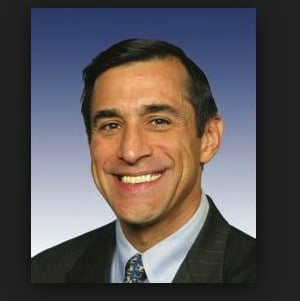
Congressman Darrell Issa (pictured) and Congressman Jerrold Nadler, the Chairman and Ranking Member of the House Judiciary Subcommittee for Courts, Intellectual Property and the Internet, have introduced legislation they say will “close a long-standing gap in federal copyright law.” It’s called the Compensating Legacy Artists for their Songs, Service, and Important Contributions to Society Act (CLASSICS).
The goal of the legislation is to bring songs made before 1972 into the federal copyright system. Audio recordings made before 1972, due to a loophole in the law, have been exempt from U.S. Copyright law. About his new legislation, Congressman Darrell Issa said this is an important and overdue fix to the law that will help settle years of litigation and restore some equity to this inexplicable gap in our copyright system. “It makes no sense that some of the most iconic artists of our time are left without the same federal copyright protections afforded to their modern counterparts. This bill is the product of a great deal of work to build consensus across party lines and varying interests all over the music and entertainment landscapes on how to best resolve this long-standing problem. I’m very proud of the work we’ve done here. It will go a long way to helping bring music licensing laws into the twenty-first century.”
The National Association of Broadcasters is neutral on this bill and declined to comment any further than that.
You may remember in June of 2016 CBS Radio won a lawsuit about this very issue. Back then, ABS Entertainment argued that pre-1972 songs were protected under state law and could not be broadcast on the radio without permission. In 2015, ABS filed a copyright case against CBS (and others) for pre-1972 recordings for artists such as Al Green. CBS lawyers responded by saying it did not publicly perform any of ABS’s pre-1972 recordings and a judge agreed. The CBS lawyers argued that “CBS does not play vinyl sound recordings. In fact every song CBS has played in the last four years has been a post-1972 digital sound recording that has been re-issued or re-mastered. CBS played only post-1972 re-issued and re-mastered digital recordings of those songs. They are protected as new and separate works.”
The company even brought in sound experts to testify about the difference between the original recordings and the newer versions. One expert testified that the recordings “have undergone sufficient changes during the remastering process to qualify for federal copyright protection.” U.S. District Court Judge Percy Anderson agreed with the CBS lawyers, determining that remastered versions of old songs get copyright — and owners of the originals can’t stop the public performance of them.
In October of 2015, Pandora announced it was paying $90 million to settle a lawsuit over royalties for songs recorded before 1972. Due to this copyright loophole, Pandora was playing the songs without compensating Warner, Sony, Universal, and other labels that have owned the rights to the master recordings in recent years. The Recording Industry Association, which represents the major labels, sued Pandora over the non-payments — shortly after Flo and Eddie of the Turtles filed suit on similar grounds.
To brush up on the story, which was all started by Flo and Eddie of The Turtles filing a lawsuit, check out David Oxenford’s many blogs about this issue.
After hearing about the new legislation, musicFIRST Executive Director Chris Israel issued a statement. Of course, he also took this opportunity to take a shot at radio and called on even more legislation to get radio to pay for the music it plays. “Recordings made before the arbitrary date of February 15, 1972, are among the most popular and valuable in the world. And yet, because of an anomaly in U.S. copyright law, the creators of those sound recordings have had to endure years of litigation simply for the right to be paid, and the litigation continues to this day. It’s time for Congress to fix this injustice so legacy artists are paid when their music is used by digital radio. Today’s introduction represents progress on the pre-72 issue and the Fair Play Fair Pay Act. Establishing equal treatment for pre-72 sound recordings, together with establishing an AM/FM performance right and applying the free market ‘willing buyer, willing seller’ standard across all platforms as called for in their Fair Play Fair Pay Act, will ensure that all artists from all generations receive fair market value for their work. We’re hopeful that the U.S. Congress will seize on the bipartisan support for music creators and enact the tenets of the Fair Play Fair Pay Act this session.”
Read the CLASSICS bill HERE.





